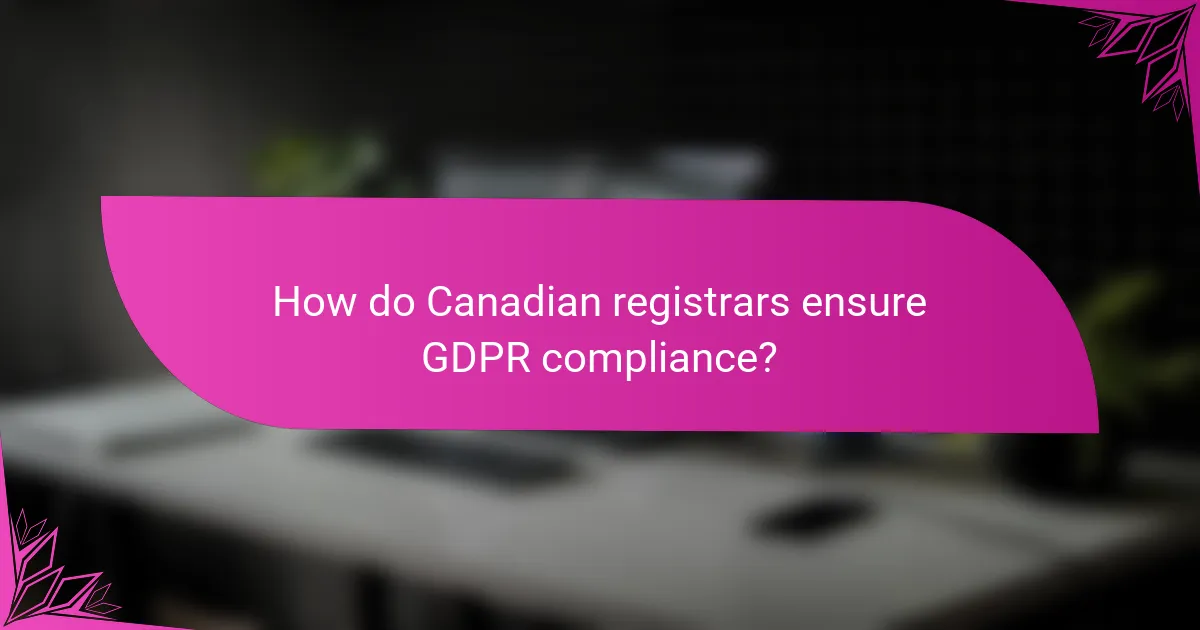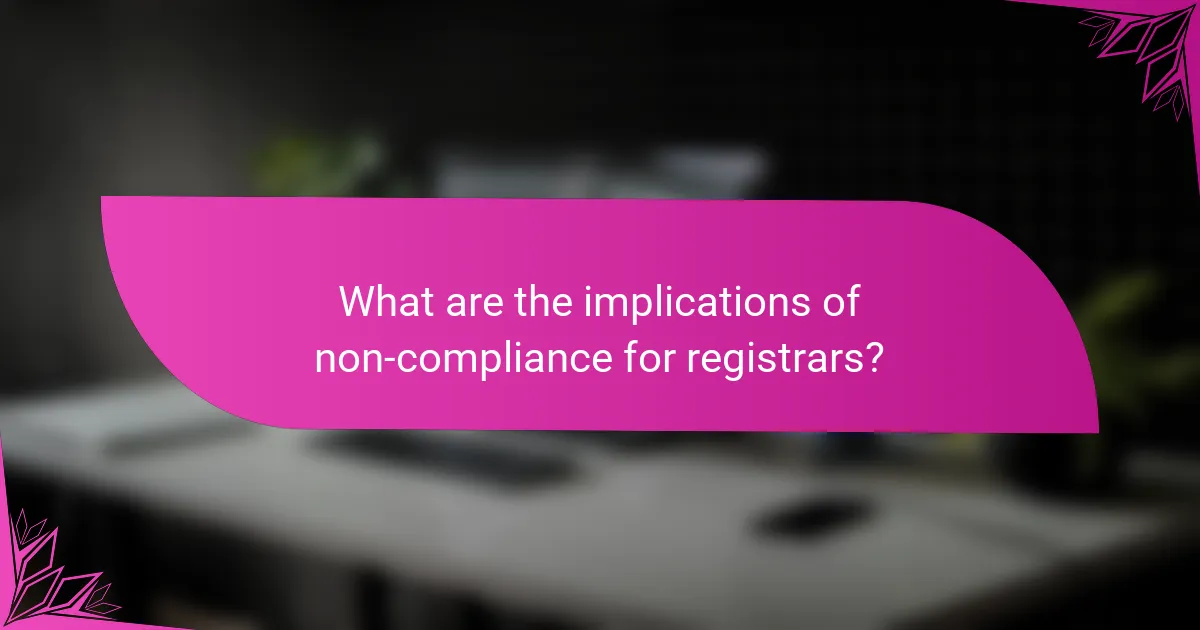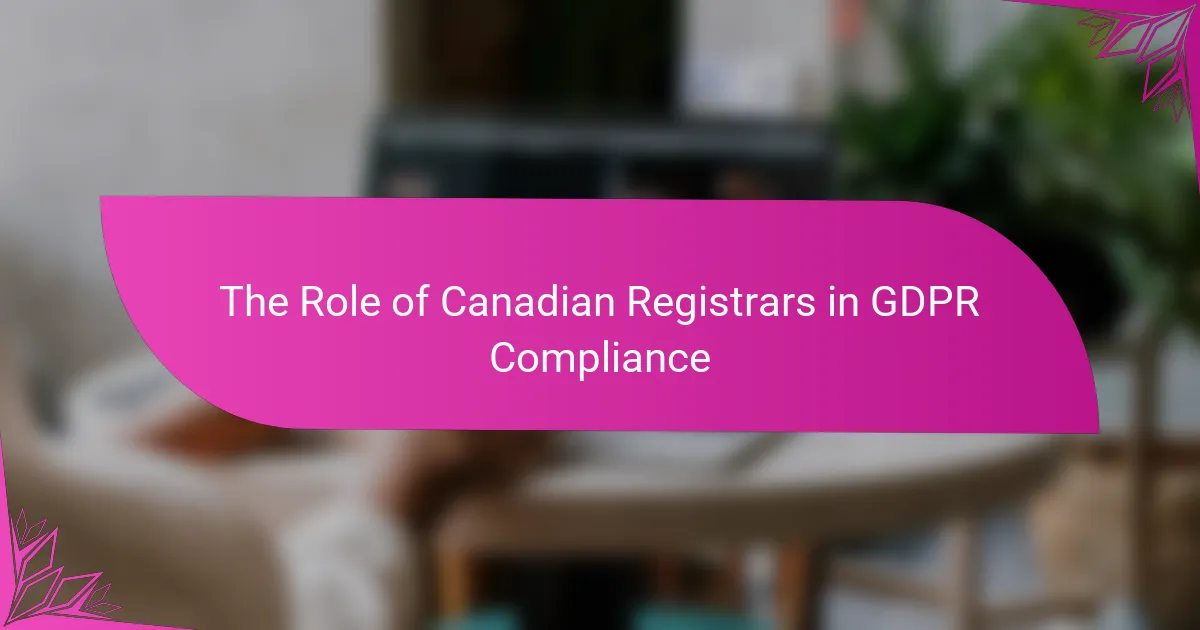Canadian registrars are pivotal in ensuring compliance with the General Data Protection Regulation (GDPR) by implementing stringent data protection measures and adhering to privacy regulations. They manage personal data responsibly, establish data processing agreements, and facilitate the management of data subject rights, thereby safeguarding individuals’ privacy in accordance with GDPR standards.

How do Canadian registrars ensure GDPR compliance?
Canadian registrars ensure GDPR compliance by implementing robust data protection measures, adhering to privacy regulations, and regularly assessing their practices. They focus on safeguarding personal data and ensuring that individuals’ rights are respected in accordance with GDPR requirements.
Data protection policies
Canadian registrars develop comprehensive data protection policies that outline how personal data is collected, processed, and stored. These policies are designed to comply with GDPR principles, ensuring transparency and accountability in handling user information.
Key elements of these policies include clear data retention schedules, user consent protocols, and guidelines for data access and sharing. Registrars often provide users with detailed privacy notices to inform them of their rights and how their data will be used.
Privacy by design principles
Privacy by design is a foundational principle that Canadian registrars adopt to integrate data protection into their systems and processes from the outset. This approach involves assessing privacy risks during the development of new services and implementing measures to mitigate those risks.
For instance, registrars may use data minimization techniques, ensuring that only necessary information is collected. They also implement strong encryption methods and access controls to protect user data throughout its lifecycle.
Regular audits and assessments
To maintain GDPR compliance, Canadian registrars conduct regular audits and assessments of their data handling practices. These evaluations help identify potential vulnerabilities and ensure that policies are effectively implemented.
Audits typically involve reviewing data processing activities, assessing compliance with privacy policies, and testing security measures. Registrars may also engage third-party experts to provide an objective assessment of their compliance efforts, ensuring continuous improvement in their data protection strategies.

What are the key responsibilities of Canadian registrars under GDPR?
Canadian registrars play a crucial role in ensuring compliance with the General Data Protection Regulation (GDPR) by managing personal data in accordance with its requirements. Their responsibilities include establishing data processing agreements and facilitating data subject rights management to protect individuals’ privacy.
Data processing agreements
Data processing agreements (DPAs) are essential for Canadian registrars to define the relationship between data controllers and processors. These agreements outline the responsibilities of each party regarding the handling of personal data, ensuring compliance with GDPR standards.
Registrars must ensure that DPAs include specific clauses that address data security measures, data breach notification protocols, and the rights of data subjects. Regular reviews and updates of these agreements are necessary to adapt to any changes in regulations or business practices.
Data subject rights management
Data subject rights management involves facilitating individuals’ rights under GDPR, such as the right to access, rectify, or erase their personal data. Canadian registrars must implement processes to respond to these requests promptly and efficiently.
To effectively manage data subject rights, registrars should establish clear procedures for verifying the identity of requesters and a timeline for response, typically within one month. Training staff on these processes and maintaining accurate records of requests can help ensure compliance and build trust with users.

How can businesses choose a compliant Canadian registrar?
Businesses can choose a compliant Canadian registrar by assessing their adherence to GDPR standards and their ability to provide necessary data protection services. Key factors include evaluation criteria, reputation, and specific support for GDPR requirements.
Evaluation criteria for registrars
When evaluating Canadian registrars, businesses should consider factors such as data protection policies, security measures, and customer service responsiveness. Registrars should demonstrate compliance with GDPR by providing clear documentation of their data handling practices.
Additionally, look for registrars that offer features like data encryption, regular security audits, and transparent privacy policies. A checklist can help ensure all critical aspects are covered during the evaluation process.
Reputation and track record
The reputation of a registrar is crucial in determining their reliability and compliance with GDPR. Research customer reviews, industry ratings, and case studies to gauge their performance and trustworthiness.
Consider registrars with a proven track record of successfully managing data for businesses in similar sectors. Engaging with current or past clients can provide insights into their experiences and the registrar’s ability to meet GDPR requirements.
Support for GDPR requirements
Support for GDPR requirements is essential for a registrar to effectively assist businesses in compliance. This includes providing tools for data access requests, data deletion, and breach notification processes.
Look for registrars that offer dedicated GDPR resources, such as compliance guides or consultation services. These resources can help businesses navigate the complexities of GDPR and ensure they remain compliant while using the registrar’s services.

What challenges do Canadian registrars face with GDPR?
Canadian registrars encounter significant challenges in achieving compliance with the General Data Protection Regulation (GDPR), primarily due to its stringent requirements and the complexities of cross-border data handling. These challenges include navigating legal obligations, managing costs, and ensuring data protection across different jurisdictions.
Cross-border data transfer issues
One major challenge for Canadian registrars is the restrictions on cross-border data transfers mandated by the GDPR. The regulation requires that personal data transferred outside the European Union must be adequately protected, which can complicate operations for registrars that handle data from EU citizens.
To comply, registrars must establish mechanisms such as Standard Contractual Clauses (SCCs) or ensure that the receiving country has an adequate level of data protection. This can lead to increased administrative burdens and potential legal risks if not managed properly.
Compliance costs
Compliance with GDPR can incur significant costs for Canadian registrars. These expenses may arise from legal consultations, technology upgrades, and staff training to ensure adherence to the regulation’s requirements. Organizations may need to invest in data protection officers or compliance teams to manage ongoing obligations.
Additionally, the potential for fines for non-compliance can further elevate costs, making it essential for registrars to budget effectively. A proactive approach to compliance can help mitigate these costs over time, but it requires careful planning and resource allocation.

How does GDPR impact Canadian businesses using registrars?
The General Data Protection Regulation (GDPR) significantly affects Canadian businesses that utilize registrars by imposing strict data protection requirements. These businesses must ensure compliance with GDPR standards to avoid potential fines and maintain customer trust.
Increased accountability
GDPR mandates that Canadian businesses demonstrate accountability in their data handling practices. This includes maintaining detailed records of data processing activities and being able to show compliance with the regulation’s principles.
To achieve accountability, businesses should implement data protection policies and appoint a Data Protection Officer (DPO) if necessary. Regular audits and training for staff on GDPR requirements can also enhance accountability.
Enhanced data protection measures
Under GDPR, Canadian businesses must adopt enhanced data protection measures to safeguard personal data. This includes implementing encryption, pseudonymization, and access controls to protect sensitive information from unauthorized access.
Businesses should conduct risk assessments to identify vulnerabilities in their data handling processes and take proactive steps to mitigate these risks. Additionally, having a clear data breach response plan is crucial for compliance and minimizing potential damage.

What are the implications of non-compliance for registrars?
Non-compliance with GDPR can lead to significant consequences for Canadian registrars, including financial penalties and damage to their reputation. Understanding these implications is crucial for registrars to ensure they meet regulatory requirements and maintain client trust.
Fines and penalties
Registrars that fail to comply with GDPR may face fines that can reach up to 4% of their annual global turnover or €20 million, whichever is higher. These penalties can be devastating, especially for smaller businesses, as they can significantly impact financial stability.
In addition to fines, registrars may incur costs related to legal fees and compliance audits. It’s essential for registrars to implement robust data protection measures to mitigate the risk of non-compliance and the associated financial repercussions.
Reputational damage
Non-compliance can severely harm a registrar’s reputation, leading to loss of client trust and potential business opportunities. Clients are increasingly aware of data protection issues and may choose to work with registrars that demonstrate a commitment to GDPR compliance.
To protect their reputation, registrars should proactively communicate their compliance efforts and data protection policies. Engaging in transparent practices can help rebuild trust and attract clients who prioritize data security.

What resources are available for Canadian registrars regarding GDPR?
Canadian registrars can access various resources to ensure compliance with the General Data Protection Regulation (GDPR). These include government guidelines and industry best practices that provide clarity on handling personal data for individuals in the European Union.
Government guidelines
The Canadian government offers resources to help registrars navigate GDPR compliance. The Office of the Privacy Commissioner of Canada (OPC) provides guidelines on how Canadian organizations can align their practices with GDPR requirements, emphasizing the importance of transparency and consent in data handling.
Registrars should familiarize themselves with the Personal Information Protection and Electronic Documents Act (PIPEDA) as it intersects with GDPR. This understanding can help registrars implement necessary changes to their data management processes and ensure they meet both Canadian and European standards.
Industry best practices
Adopting industry best practices is crucial for Canadian registrars to maintain GDPR compliance. This includes implementing robust data protection measures, such as encryption and access controls, to safeguard personal information. Regular audits and assessments can help identify potential vulnerabilities in data handling practices.
Collaboration with legal experts and data protection officers can also enhance compliance efforts. Registrars should consider creating a data protection impact assessment (DPIA) process to evaluate risks associated with data processing activities and ensure they are taking appropriate steps to mitigate those risks.

What emerging trends affect Canadian registrars and GDPR compliance?
Canadian registrars are increasingly adapting to GDPR compliance due to heightened scrutiny and evolving data protection standards. Key trends include the integration of privacy-by-design principles and the adoption of advanced data management technologies to ensure compliance with European regulations.
Increased focus on data sovereignty
Data sovereignty is becoming a critical concern for Canadian registrars as they navigate GDPR compliance. This trend emphasizes the need for data to be stored and processed within specific geographic boundaries to meet legal requirements. Registrars must ensure that their data centers comply with both Canadian and European regulations to avoid potential penalties.
For example, registrars may need to partner with local data centers in the EU or implement robust data transfer agreements to safeguard personal information. Understanding the implications of data sovereignty can help registrars maintain compliance while serving clients effectively.
Adoption of privacy-enhancing technologies
The adoption of privacy-enhancing technologies (PETs) is on the rise among Canadian registrars as they seek to comply with GDPR. These technologies, such as data anonymization and encryption, help protect personal data while allowing organizations to leverage it for business purposes. Implementing PETs can reduce the risk of data breaches and enhance customer trust.
Registrars should evaluate various PETs based on their specific needs and regulatory requirements. For instance, using strong encryption methods can safeguard sensitive data during transmission and storage, aligning with GDPR’s stringent security mandates.
Collaboration with legal and compliance experts
Collaboration with legal and compliance experts is essential for Canadian registrars to navigate the complexities of GDPR. Engaging professionals who specialize in data protection can provide valuable insights into compliance strategies and risk management. This collaboration can help registrars identify potential gaps in their processes and implement necessary changes.
Regular training and updates from legal experts can ensure that registrars remain informed about evolving regulations. Establishing a compliance framework that incorporates legal advice can streamline operations and enhance overall GDPR adherence.
